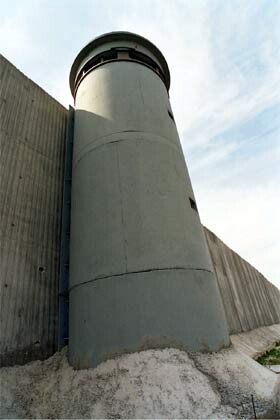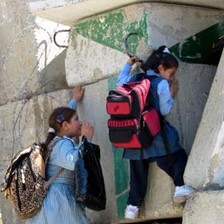The Electronic Intifada 7 November 2003

The Apartheid Wall in Qalqiliya. (PENGON/Anti-Apartheid Wall Campaign)
According to a report prepared by the World Bank, the order will directly affect 95,000 Palestinians living within the “closed military zone” and another 20,000 living to the east of the wall whom the wall has separated from their livelihoods and relatives. The report goes on to note that the wall crosses agricultural roads, cuts off residents from their water supply, from their schools, businesses, public services and farms.
The specifically racial criteria used to decide who has access to the occupied lands west of the wall have led human rights activists to describe the 650 km long steel and concrete barrier as an “Apartheid Wall” and note that the enclaves created by its construction compare unfavourably with the ghettoes created for Europe’s Jews and the Bantustans created for South Africa’s blacks during the Apartheid era.
In an opinion piece written in late November for the Canberra Times, Israeli Ambassador Gabby Levy dismissed such comparisons as factually and historically inaccurate. The wall, he claimed, was being built purely to defend Israelis from Palestinian suicide attacks. The fact that it was being built well inside the West Bank rather than following the border with Israel, he argued, reflected the fact that parts of the West Bank are on higher ground than Israel, “thereby providing a strong tactical advantage”. As the Palestinian resistance lacks the weaponry to effectively fire over the wall, Mr. Levy was presumably implying that suicide bombers might make use of this “advantage” to vault over it.
The Ambassador also noted that gates are being built into the Wall, to allow the passage of farmers to their fields.
So is the wall really simply a matter of self-defence?
A cursory glance at a map reveals that the path of the wall’s construction is being built deliberately to grab as much land as possible for the settlements west of the wall. These exclusively Jewish colonies are being built in defiance of international law and the Geneva Convention and on land that Israel has seized from its Palestinian owners.
Palestinians attempting to use the wall’s gates have found that soldiers manning them have opened them only at random intervals for only a few minutes at a time. Since the start of this year’s olive harvest, farmers attempting to pass through the gates in tractors or other vehicles have been turned away. Women have complained of sexual harrassment and threats of rape. On certain days the gates have remained unopened. Those farmers who have tried sleeping in their fields (a practice illegal since the signing of General Kaplinski’s order) have been attacked by soldiers and Jewish settlers.
Under international law Apartheid is defined as “a system of institutionalised racial segregation and discrimination for the purpose of establishing and maintaining domination by one racial group over another and systematically oppressing them.” Under the 1973 International Convention on Apartheid the creation of ghettos, land confiscation and prohibition of freedom of movement are all defined as acts of Apartheid.
On 22 October the United Nations General Assembly noted that the wall was in “contradiction to relevant provisions of international law” and called upon Israel to “stop and reverse the construction of the wall in the Occupied Palestinian Territory”. The resolution was passed by 144 votes to 4, with only the United States, Israel, Micronesia and the Marshall Islands voting against it.
Last month an Israeli peace delegation, which included several prominent politicians and former generals, revealed the details of a peace plan they had negotiated with their Palestinian counterparts. Under the plan, the Palestinian side would renounce the right of Palestinian refugees to return to their homes in Israel in return for a demilitarised Palestinian state whose borders would be controlled by an international force.
The reaction of Israeli Prime Minister Ariel Sharon was to dismiss the plan out of hand.
In the short-term, he is probably right in believing that time is on his side. With US presidential elections looming and a coalition of right-wing Jews, fundamentalist Christians and arms companies lobbying all candidates to express their unconditional support for Israel, it is unlikely that any UN resolution will succeed in halting the wall’s construction.
Whether the wall will succeed in finally breaking the Palestinians’ will to resist the Occupation and accept their status as a conquered people remains to be seen.
Michael Shaik is a former Palestine-based media coordinator of the International Solidarity Movement.



